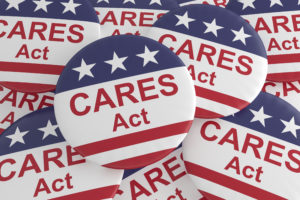
On March 25th, 2020 the Senate passed the Coronavirus Aid, Relief, and Economic Security Act (the “CARES Act”). We have been helping many clients navigate the CARES Act to determine which available funding programs best match their needs. The CARES Act includes $2.2 trillion in emergency economic assistance, $350 billion of which is earmarked for the “Paycheck Protection Program” (the “PPP”). The CARES Act also expands the ability of the SBA to originate $2,000,000 Economic Injury Disaster Loans (“EIDL(s)”), and related $10,000 emergency advances under EIDLs.
General Overview of SBA CARES Act Loans
SBA loans are generally only available to businesses with 500 or fewer full-time equivalent employees. The CARES Act waives: i) a standard requirement that borrowers demonstrate that they are unable to obtain credit elsewhere; ii) personal guarantees on EIDL originations below $200,000 (there are no personal guarantees on PPP loans); and iii) the one-year in operation requirement, so long as the business was operating before January 31, 2020 in the case of EIDLs, and February 15, 2020 in the case of PPP loans. The PPP loan application requires a simple good faith certification that the current economic uncertainty makes the loan request necessary to support the ongoing operations of the applicant. SBA lenders will provide detailed underwriting requirements.
The CARES Act expands eligibility beyond for-profit businesses to nonprofit organizations, veteran organizations, and tribal business concerns. There are also special exceptions for food services businesses to permit applications for businesses with more than 500 employees, so long as they do not have more than 500 employees per physical location. Sole proprietors, independent contractors and self-employed individuals are also eligible borrowers. There are no prepayment penalties for PPP loans or EIDLs. The SBA is required to issue additional lending regulations within 15 days of enactment of the CARES Act.
The Paycheck Protection Program
The “Covered Period” for PPP loans is February 15, 2020 to June 30, 2020. The PPP provides for loans by approved SBA lenders of up to $10,000,000. If PPP loan advances are utilized for permitted uses in the 8-week period following origination, they are eligible for forgiveness.
Determining the Maximum Advance
The maximum amount of a PPP loan is limited to the lesser of: i) 250% of the average trailing monthly payroll costs incurred by the borrower (generally calculated over the 1-year period before the advance, and capped at $100,000 on an annualized basis for each employee), and ii) $10,000,000. The borrower application form permits entities with an outstanding EIDL to add the EIDL amount to the PPP loan advance and consolidate the two balances under a single PPP loan (note that any emergency advance on an EIDL must be netted from the requested loan amount). If an EIDL is consolidated with a PPP, borrowers must remember that the loan forgiveness regulations still apply – to the extent a loan is not forgiven, a term loan will remain outstanding.
Permitted Uses
The CARES Act specifies the following permitted uses: i) payroll costs; ii) costs related to the continuation of group health care benefits, iii) employee salaries, commissions or similar compensation, iv) payments of interest on mortgages, v) rent, vi) utilities, and vii) interest on other debt obligations.
Loan Forgiveness
PPP borrowers may apply for forgiveness of amounts disbursed during the 8-week period following the loan origination date for amounts spent on: i) payroll costs (capped at $100,000 on an annualized basis for each employee); ii) approved interest payments; iii) approved rent obligations; and iv) covered utility payments. For all non-payroll costs, the obligation to pay such costs must exist prior to February 15, 2020. Loan forgiveness amounts are ratably reduced by i) any reduction in the number of employees during the 8-week disbursement period, and ii) the amount of any reduction in total salary and wages of an employee during the 8-week period that is in excess of 25% of the total salary or wages of such employee during the most recent full quarter during which the employee was employed before the 8-week period. There is no penalty in the forgiveness calculation for reductions in staffing so long as the employer rehires employees or discontinues reduced salary payments by June 30, 2020; however, borrowers should remember that PPP loan advances must be spent during the 8-week period to qualify for forgiveness.
Interest Rate and Term
The current interest rate guidance for PPP loans is 1% fixed with a maximum maturity of 2 years. The loans defer all interest and principal for 6 months.
Economic Injury Disaster Loans
The CARES Act expands eligibility for $2,000,000 EIDLs and permits recipients of EIDLs obtained after January 31, 2020 to refinance EIDLs into PPP loans by indicating their desire to do so on the PPP application. Borrowers should remember that applications cannot be made for EIDLs and PPP loans to cover the same costs. Working capital loans under the EIDL program paired with PPP loans for payroll costs may be useful to certain borrowers. The $10,000 emergency advance on an EIDL should occur within three days of receipt by the SBA of an EIDL application. Borrowers wishing to apply for EIDLs can do so directly on the SBA website. The maximum term of an EIDL is 30 years, and the maximum statutory quoted interest rate is 3.75% for for-profit entities and 2.75% for nonprofits. EIDLs may be quickly approved based upon credit scores. With the exception of the $10,000 emergency advance, EIDLs are not eligible for forgiveness.
Evolving Landscape
All applicants for CARES Act funding should first review their existing credit and finance agreements to make certain existing loan and finance covenants permit the incurrence of additional indebtedness. The explicit nonrecourse nature of PPP loans, coupled with the opportunity for material forgiveness of indebtedness, is likely to prompt many lenders to waive any blocking covenants.
Borrowers should consult more detailed regulations on loan forgiveness that are anticipated in the near future. The PPP application indicates not more than 25% of the loan advance may be used for approved non-payroll costs. Any canceled indebtedness from loan forgiveness is excluded from gross income for U.S. federal income tax purposes. Borrowers should discuss the interaction of various CARES Act tax credits and CARES Act loans with their accountants.
The press is reporting multiple problems with the application and origination process for PPP loans. On April 6, 2020 the Federal Reserve indicated it would provide a backstop to SBA lenders as part of the CARES Act. Additional incentives for participating SBA lenders are expected to be announced this week by the Federal Reserve.
Let us know if you need help with the CARES Act, or other COVID-19 related issues. Because the COVID-19 pandemic is a fluid situation, and because risks can be presented in a myriad of ways, it is important to analyze each situation on a case-by-case basis, to determine the appropriate course of action. For assistance, please contact your regular Morningstar Law Group attorney, or Morningstar Law Group Senior Counsel Scott Ryan (sryan@morningstarlawgroup.com or 919-590-0359).
